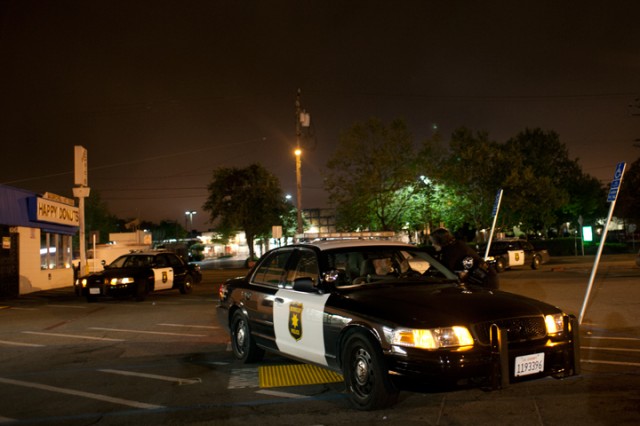“Even in Berkeley which has an excellent and well-trained police force, and a city with a long history of progressive values, racial profiling has occurred throughout our city’s history,” the supporting city document states.
Police training on the policy has already begun and is expected to be complete within four months.
Several speakers at the meeting said they had witnessed, or been subject to, racial profiling by Berkeley Police.
Local resident Charles Brown, who said he works at the Berkeley Flea Market among other things, described witnessing an African American man being arrested at the market for “talking too loud.”
Controversial Video
Reference was made to a recent video of a police stop of a group of young people, some of whom were former UC Berkeley students, which sparked accusations of racial profiling by BPD officers.
"Too many of our young black and brown youth are stopped for jaywalking, or ‘walking or driving while black,’” said Barbara White, vice-president of the Berkeley NAACP. “If we continue to racially profile young people they will be fearful of coming to Berkeley.” She added: “Officers not doing their job should be accountable."
Berkeley NAACP President Mansour Id-Deen urged the Council to adopt the policy, saying 34 cities in California had already implemented data collection.
The move comes on the heels of a town hall meeting organized by the Berkeley NAACP last month to discuss racial profiling, which was attended by more than 100 members of the community.
Councilman Max Anderson said he wished more of his colleagues on the Council had been at the meeting to hear testimony from so many about biased policing. “Some people don’t see it as their problem,” he said. Anderson said the new policy was an opportunity for training and upgrading skills in the city and “ensuring all citizens are treated in a fair and impartial way.”
Councilman Arreguín stressed how important it would be to have detailed police stop data so as to be able to determine whether the policy was making a difference.
"This is critical in maintaining the Berkeley police force’s reputation as progressive," he said.
Berkeley City Manager Christine Daniel will request the police department put the policy — which was voted in unanimously and is known as General Order B4 — into effect within four months.
Both she and Berkeley Police Chief Michael Meehan will report back to the Council after the summer recess on the status of relevant training for police officers, as well as the implementation of the policy. The Council agreed they would ideally like to see annual reporting of stop and search data.
KQED News Associate Berkeleyside is an independently owned news website based in Berkeley. Click here if you would you like to receive the latest Berkeley news in your inbox once a day for free with Berkeleyside's Daily Briefing email.
